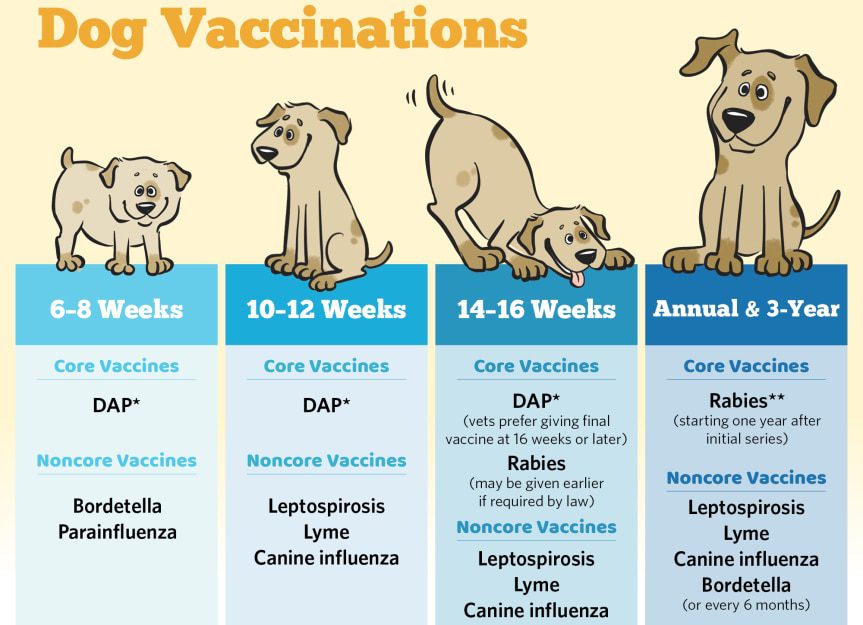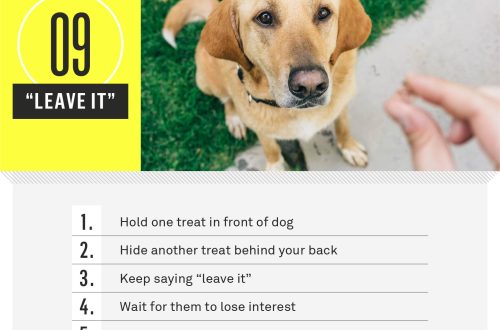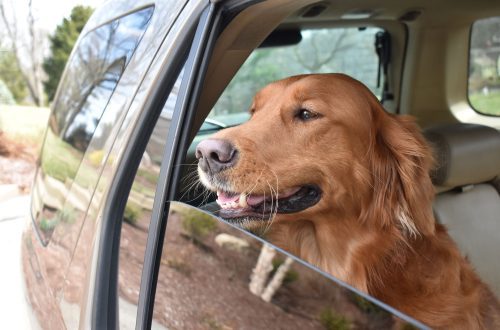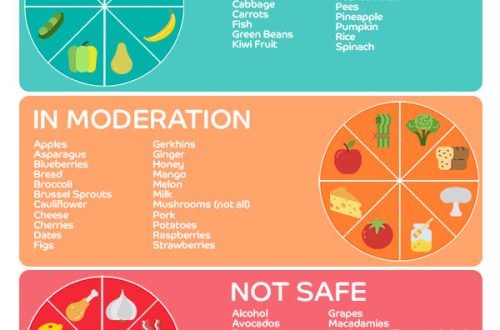
Vaccinations for puppies by age
The dog’s health depends on how the owners take care of it – what kind of food it receives, whether it has an active lifestyle, whether all vaccinations and antiparasitic treatments have been done on time. Sometimes the need for vaccination is questioned. Some consider the procedure unnecessary, as they hope that the pet’s immunity is already strong enough to resist various kinds of infections. We will try to convince you that this is the wrong approach, which can lead to unpredictable consequences.
Contents
Why vaccinate dogs?
From birth until about 8 weeks of age, puppies are protected from certain infections by colostral immunity, i.e. acquired through their mother’s milk. This type of protection is temporary – as the pet grows older, it becomes more susceptible to pathogens of various diseases. That is why it is better to vaccinate puppies older than 8 weeks – by this time, the mother’s antibodies will no longer protect them, which means that the effect of the vaccine will be maximum.
Vaccination protects your pet from many dangerous diseases, and the lack of vaccinations poses a threat to his health and life. An unvaccinated animal cannot be taken with you on trips, participate in exhibitions with it, or give it up for overexposure. In addition, there is a threat of transmission of such a deadly disease as rabies to humans. For general safety, the animal must be vaccinated.
Features that are useful to know
There is no difference in the vaccination schedule, the diseases for which vaccinations are given, and the doses of drugs administered, depending on the breed of the dog. Breed does not affect the choice of vaccine.
To prepare for a successful routine vaccination, you need to prepare:
- Daily monitoring of the pet’s condition is required – monitoring the temperature, stool, general condition. This is important because vaccinations are only given to healthy puppies.
- After consultation with a veterinarian, deworming is carried out before vaccination.3. The pet needs to provide a complete healthy diet, not only before vaccination.
- There must be a time interval (three to four weeks) between vaccinations.
- On the day of vaccination, the puppy can be fed normally.
- Veterinarians vaccinate only clinically healthy animals.
A sick puppy is not vaccinated until he is in good condition. Vaccination is also not carried out for pregnant dogs and puppies up to two months old. At the 8th week of life, the pet must have at least one vaccination. The very first vaccine is administered against parvovirus enteritis (at 6 weeks).
There are many preparations for vaccination, both foreign and domestic manufacturers. For everything to go well, you need the advice of an experienced specialist. Comparing the individual characteristics of the animal (age, weight, state of health), the doctor will draw up a schedule for all mandatory vaccinations in accordance with the standards and select the right drug.
Mandatory vaccinations
A wide range of viral diseases is dangerous not only for animals, but also for their owners. The most effective way to protect yourself is vaccination. Our four-legged friends are most vulnerable to the following common diseases:
- rabies,
- carnivore plague,
- viral hepatitis or adenovirus,
- parvovirus enteritis.
It is mandatory to vaccinate an animal against these diseases. It is worth following the schedule exactly and do not forget to consult with a veterinarian. It is important to take care of the pet’s health under the supervision of a specialist, without trying to treat it yourself. Only a veterinarian can give complete information on this issue. Entrusting the life and health of a four-legged pet to a professional means avoiding serious consequences from incorrect or untimely actions.
Period after vaccination: possible complications and precautions
In the first 2 weeks, an adaptation of the animal’s body to the administered drug is observed, i.e., immunity to the disease is developed. For this period, quarantine conditions must be created for the puppy. In doing so, you need:
- Reduce walking time, especially in bad weather conditions (rain or severe frost).
- Limit contact with other animals and dirty objects.
- Protect your pet from excessive stress, fatigue and freezing.
- Do not bathe him after vaccination. If it is really necessary, you can wash your paws. You can bathe your pet in a week – this time is enough for him to return to his usual rhythm of life.
There are also certain risks. They can be classified into two categories:
- general complications (weakness, lack of appetite, fever);
- local allergic reaction (bumps and pain in the injection area – resolve and disappear within 1-2 weeks).
If the body has successfully adapted, the general condition of the pet will return to normal within two days. In case of prolonged recovery and no improvement, you should immediately contact a veterinarian. Neither the scientific literature nor publications on this topic on the Internet can replace consultation with a professional – his recommendations and instructions are considered a priority both before vaccination and at the time of its implementation, and after.
Vaccination schedule
The World Small Animal Veterinary Association (WSAVA) has developed guidelines for vaccination of dogs and cats. A sample vaccination schedule is as follows (your veterinarian will help you draw up the exact vaccination plan for your pet):
From what disease | 1st treatment (dog age) | 2nd procedure | Periodicity |
Rabies | 12 weeks | No | Annually in the territory of the Russian Federation |
Plague of carnivores | 6-8 weeks | 2-4 weeks after the 1st treatment | Booster at 6 months or 1 year of age, then every 3 years |
infectious hepatitis | 6-8 weeks | 2-4 weeks after the 1st treatment | Booster at 6 months or 1 year of age, then every 3 years |
Parvovirus enteritis | 6-8 weeks | 2-4 weeks after the 1st treatment | Booster at 6 months or 1 year of age, then every 3 years |
Canine parainfluenza | 6-8 weeks | 2-4 weeks after the 1st treatment | Annually |
Leptospirosis | 8 weeks | 2-4 weeks after the 1st treatment | Annually |





